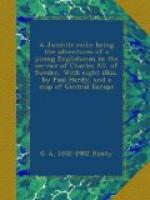The battle was a severe one, for the Swedes were unprovided with artillery, and the Saxons, with the advantages of position and a powerful artillery, fought steadily. Three times Marshal Steinau led his cavalry in desperate charges, and each time almost penetrated to the point where Charles was directing the movements of his troops; but, at last, he was struck from his horse by a blow from the butt end of a musket; and his cuirassiers, with difficulty, carried him from the field. As soon as his fall became known, disorder spread among the ranks of the Saxons. Some regiments gave way, and, the Swedes rushing forward with loud shouts, the whole army was speedily in full flight.
This victory laid the whole of Courland at the mercy of the Swedes, all the towns opening their gates at their approach.
They were now on the confines of Poland, and the king, brave to rashness as he was, hesitated to attack a nation so powerful. Poland, at that time, was a country a little larger than France, though with a somewhat smaller population, but in this respect exceeding Sweden. With the Poles themselves he had no quarrel, for they had taken no part in the struggle, which had been carried on solely by their king, with his Saxon troops.
The authority of the kings of Poland was much smaller than that of other European monarchs. The office was not a hereditary one; the king being elected at a diet, composed of the whole of the nobles of the country, the nobility embracing practically every free man; and, as it was necessary, according to the constitution of the country, that the vote should be unanimous, the difficulties in the way of election were very great, and civil wars of constant occurrence.
Charles was determined that he would drive Augustus, who was the author of the league against him, from the throne; but he desired to do this by means of the Poles themselves, rather than to unite the whole nation against him by invading the country. Poland was divided into two parts, the larger of which was Poland proper, which could at once place thirty thousand men in the field. The other was Lithuania, with an army of twelve thousand. These forces were entirely independent of each other. The troops were for the most part cavalry, and the small force, permanently kept up, was composed almost entirely of horsemen. They rarely drew pay, and subsisted entirely on plunder, being as formidable to their own people as to an enemy.
Lithuania, on whose borders the king had taken post with his army, was, as usual, harassed by two factions, that of the Prince Sapieha and the Prince of Oginski, between whom a civil war was going on.
The King of Sweden took the part of the former, and, furnishing him with assistance, speedily enabled him to overcome the Oginski party, who received but slight aid from the Saxons. Oginski’s forces were speedily dispersed, and roamed about the country in scattered parties, subsisting on pillage, thereby exciting among the people a lively feeling of hatred against the King of Poland, who was regarded as the author of the misfortunes that had befallen the country.




